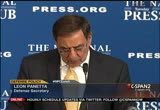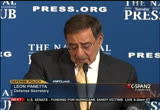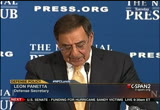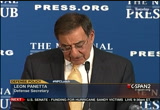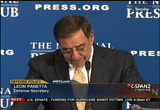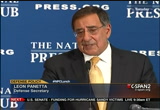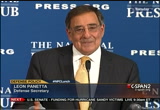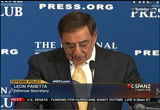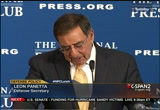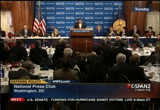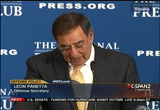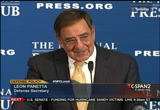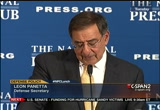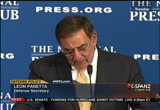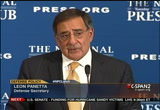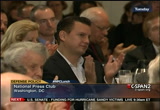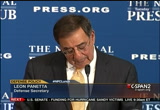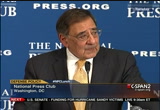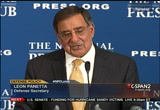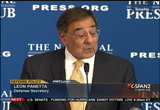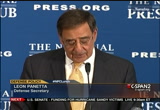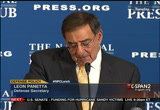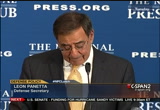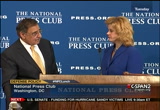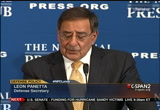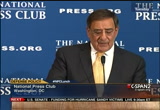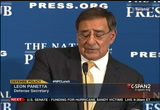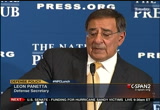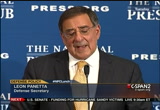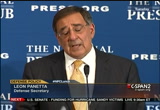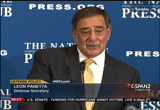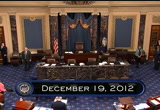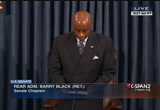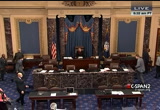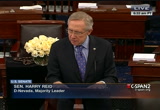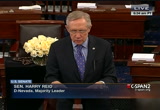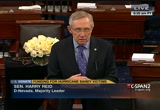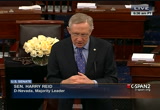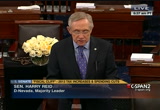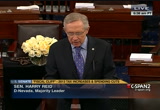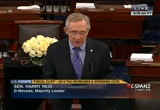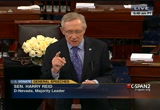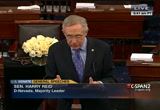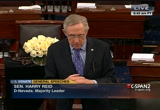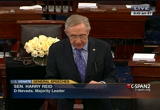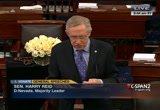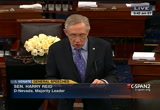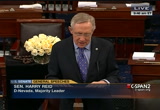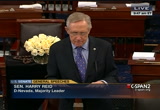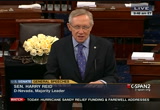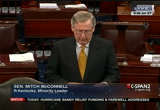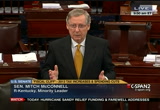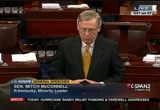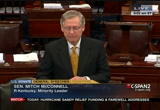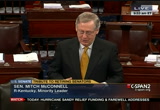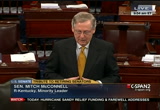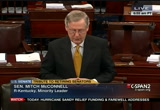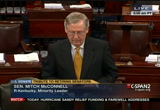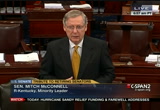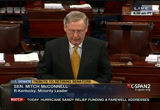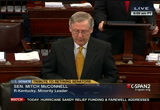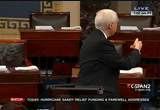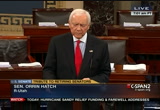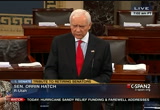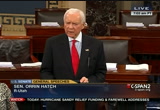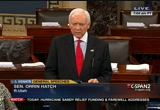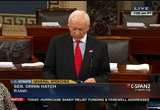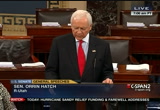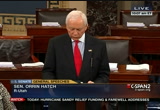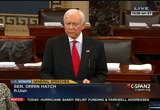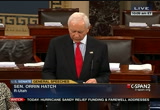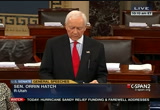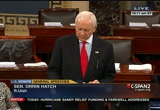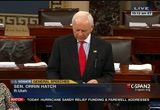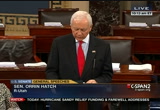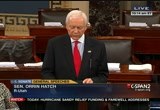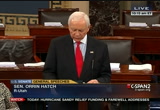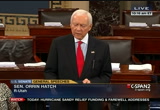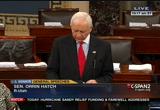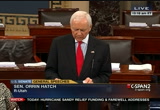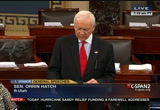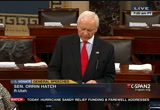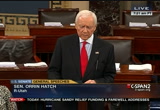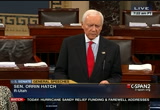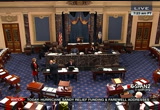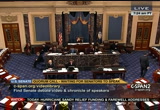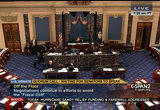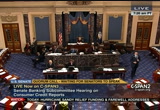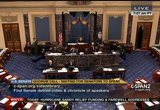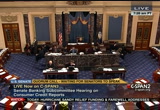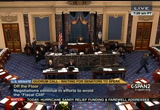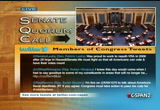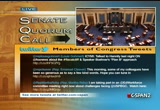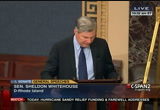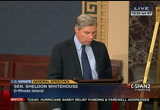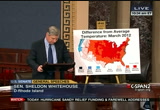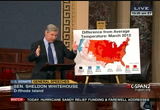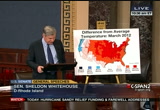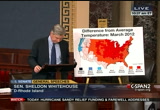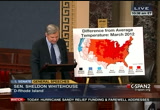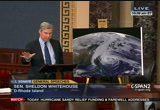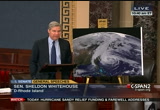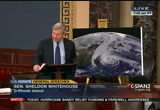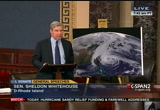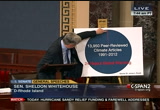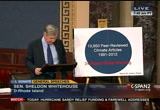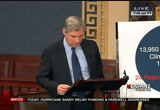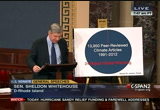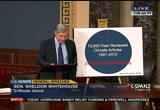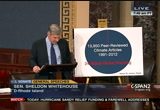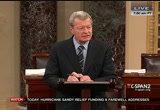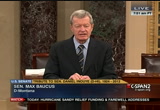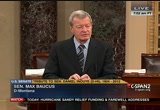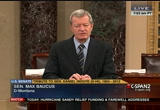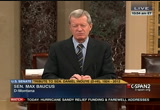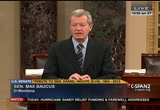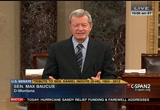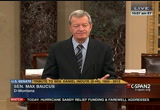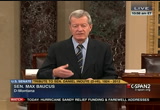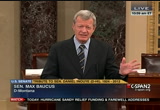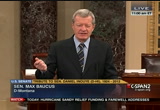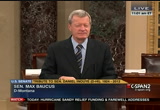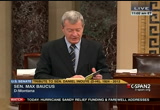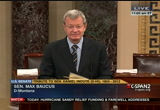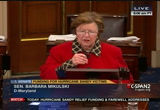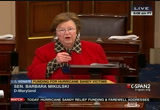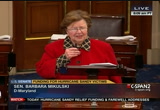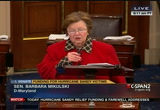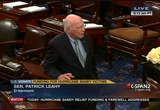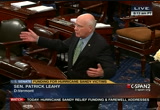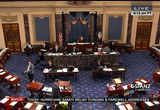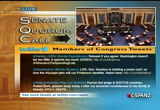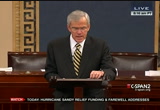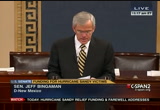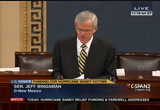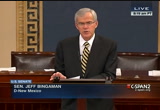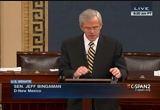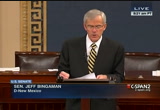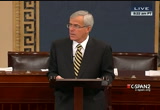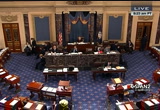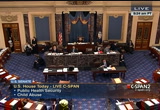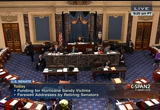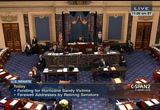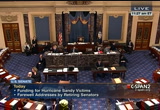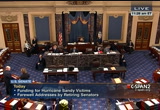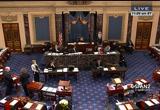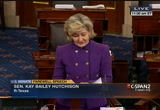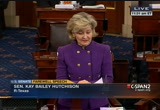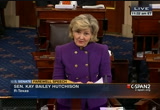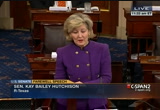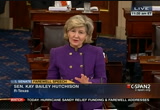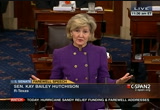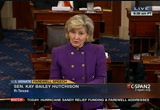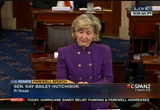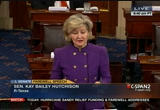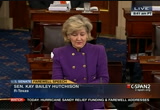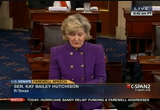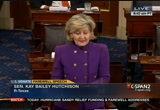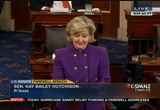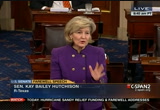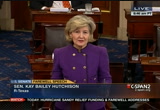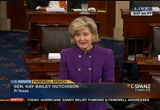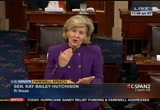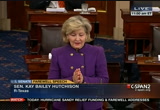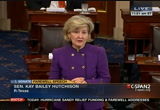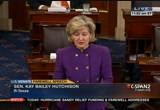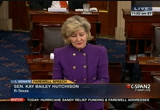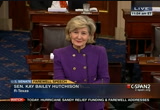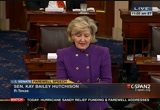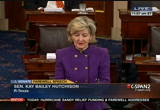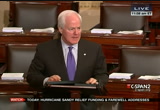tv U.S. Senate CSPAN December 19, 2012 9:00am-12:00pm EST
9:01 am
more quickly confronting a wider range of threats across a more dispersed geography. this past february, the navy and marine corps conducted their first large-scale amphibious exercise in more than 10 years. in march, the army conducted its first exercise in its new decisive action training environment that emphasizes combined arms maneuver against a combination of irregular and neither fear conventional opponents. the second element of our defense strategy is to maintain our force projection where we need it. in the middle east and in the asia-pacific region. the asia-pacific region is obviously an area of growing
9:02 am
importance for our economy and our security. in the middle east, obviously represents continuing threats to our security as well. even after the withdrawal of troops from iraq, we have maintained a substantial military presence in the middle east in order to deter aggression, respond to crisis, ensure regional stability in the face of historic unrest, and the continuing threats from iran. last week i visited some of our troops based in kuwait, part of a robust gulf posture that includes roughly 50,000 troops, dozens of ships, fighters, bombers, advanced intelligence, surveillance and reconnaissance platforms. we are partnering closely with
9:03 am
the gulf states to boost their capacity in critical areas such as missile defense, encounter mining, which will help reduce the pressure to sustain these larger deployments over the long term. i also visited the airbase in turkey where i announced deployment of the to u.s. patriot missile batteries as part of the nato effort to try to help protect our turkish allies against the threat of missiles from syria. even as we have asserted our strong and enduring commitment to the middle east, we are also renewing and expanding our engagement in the asia-pacific region. the core of our rebounds is modernizing our existing network of alliances and security partnerships throughout the
9:04 am
region. and developing new security relations as well. over the past year, we reached major agreements with japan to realize our forces and jointly develop guam as a strategic hub. we afford to strengthen cooperation for the republic of korea, in space, in cyberspace, and intelligence. we begin a new marine rotational deployment to australia as well as increased air force cooperation. likewise, we are deepening our engagement and developing rotational deployment with allies and partners such as singapore and the philippines, and expanding our mil-to-mil dialogue and exchanges with china. we are also enhancing our presence and capabilities in the region. that includes reality the naval fleet -- reallocating the naval
9:05 am
fleet to achieve a 60-40 split between the pacific and atlantic oceans. hopefully will do that by 2020. increasing army and marine presence in the region, after iraq and afghanistan. locating our most advanced aircraft in the pacific, including the deployment of f-22's and the in the 22 ospreys in japan. and laying the groundwork for the first overseas deployment of the f-35 joint strike fighter in 2017. the third element of our strategy is that as we do force projection in the asia-pacific and in the middle east, we still have to maintain our global leadership and presence. i building innovative partnerships and partner capacity across the globe, and
9:06 am
using these innovative rotational deployments as a way to do exercises and training with other countries, developing their capabilities so they can help provide for their own security. in latin america, in africa, in europe and elsewhere. the past decade of war has reinforced the lesson that one of the most effective ways to address long-term security challenges is to help build the capabilities of our allies. we have seen this approach with our counterinsurgency campaigns and iraq and afghanistan, and our counterterrorism efforts in yemen and somalia. we are expanding our security forces assistance to a wider range of partners in order to address a broader range of security challenges in asia-pacific, in the middle east. and as i said, in europe, africa
9:07 am
and in latin america. to implement this element of the strategy, the services are retaining the security cooperation capabilities we have honed over a decade of war. and making investments in regional expertise. for example, for the armies new structure, they are able to, in fact, engage on a rotational basis to assist other countries. the entire u.s. government is working to make our security cooperation, particularly for an military sales, more responsive and more effective, to cut through the bureaucracy, to cut through the red tape, to be able to provide the assistance that we need to other countries without delay. we are particularly seeking to boost defense trade with rising powers like brazil and india. i visited these countries recently to help advance those
9:08 am
growing defense partnerships, and ash carter has also made an effort in a new joint u.s.-india initiative to boost defense cooperation in trade and streamline our respective export control processes. in order to remain the security partner of choice, the united states must maintain our decisive military edge and adapt to any emergency threats. the fourth element of the new defense strategy is that we must always remain capable of being able to confront and defeat aggression from more than one adversary at a time. anywhere, anytime. that means if we're engaged in a conflict in the korean peninsula and iran attempts to close the straits of hormuz, we must be capable of being able to respond
9:09 am
decisively to both locations. with the strategy we've developed, we believe we have that capability. we are maintaining our ability to simultaneously operate in multiple theaters by investing in critical power projection capabilities, our aircraft carrier fleet, our big deck amphibious fleet, a new afloat forward staging base, and long-range strike capability. we are also making new investments in the new generation bomber, a next-generation tanker that will afford our air force's greater mobility, and working every day to put our joint strike fighter program on a firmer footing. to stay ahead of the growing capabilities of potential adversaries and ensure our ability to quickly defeat aggression, we have begun to we examine our plans in order to ensure that we're prepared for
9:10 am
the most realistic scenarios for new and unconventional threats and for asymmetric attacks. we are also refining emerging operational concepts, including joint operational access in air-sea battle that will ensure our ability to project power in areas where our enemies seek to deny us access. and the fifth element, the last element of our strategy, is that this cannot just be about cutting back on defense. we must also be able to invest in the future, to protect and prioritize key investments in technology and new capabilities, as well as our capacity to grow, to adapt, and to mobilize as needed. throughout the strategy review, i made clear that this cannot be simply an exercise, a budget
9:11 am
exercise in deciding where were going to cut. we've made those decisions. we've looked at better efficiencies. we have looked at reductions in force structure. we have looked at procurement reforms. we have a look at compensation. all of those areas were part of our budget proposal to try to achieve the $487 billion in savings. but if we are to maintain the finest military in the world, the finest military force, the finest military power in the world, we've got to invest in priority missions for the future. for example, despite budget reductions, we are expanding our fleet of unmanned systems. this is the future. including new carrier launched surveillance and strike aircraft. in order to boost priority counterterrorism and build partner capacity efforts, we are
9:12 am
continuing a planned growth in special operations forces which will reach 72000 by 2017, more than double the number we had on 9/11. we have protected investments in countering weapons of mass destruction and accelerated testing of mobile air sampling systems and ground sensors for nuclear forensics. we are significantly increasing our cyber capabilities, including our greatest asset, talented, bright manpower. the department has also recently developed new rules of engagement in cyberspace that clarify our mission to defend the nation and will enable us to more quickly respond to cyber -- cyber threats. we are also protecting our ability to read grow and mobilize the force by emphasizing our guard and our reserve readiness and protecting a strong industrial base.
9:13 am
if we face a crisis, if i have to mobilize, the last damn thing i can do is to contract that responsibility out to another country. i have got to rely on our industrial security base to be there and be able to respond. [applause] >> these are the five elements of the defense strategy and some of the important steps that we've taken so far to implement it. as a department, we are continuing to refine that strategy, and we will continue to do that, to assess the risks that might prevent us from effectively implementing it. but right now, as i speak, icq principal risks. the first risk is the stress on the force. which is still operating at a very high tempo more than 11 years after september 11. we are still at war in
9:14 am
afghanistan. we have been on a crisis posture in the middle east and north africa for the past year. and we will continue to maintain a strong presence in that region even as we read balance to the asia-pacific area. -- read balance to the asia-pacific area. our outstanding men and women in uniform are the foundation of everything we do. i've often said we have great weapons. i've got great chips, i've got great bombers. none of that is worth a damn without the u.s. men and women in uniform that serves this country. [applause] >> we need to ensure, we need to ensure that service members and their families have the support that they have earned in areas
9:15 am
like health and education and employment, and they transition back into their communities so that they can be able to go back home and reestablish their ties to their communities. in our budget, we've made a concerted effort to ensure the health of the force, their readiness, by protecting operations and maintenance accounts, by keeping the fastest and most flexible weapons platforms, sustaining investment to high quality personnel and research in science and technology. but nevertheless, there is pressure on the department to retain access for structure and infrastructure instead of investing in the training and equipment that makes our force agile and flexible and ready. aircraft, ships, tanks, bases, even those that have outlived their usefulness have a natural political constituency.
9:16 am
readiness does not. what's more, readiness is too often sacrificed in favor of a larger and less effective force. i am determined to avoid that outcome. therefore, i directed that readiness be treated as a strategic imperative for the department, and we have launched an initiative to assess and improve our readiness across the board. our effort to do everything possible to ensure a ready force it also explains why we expressed concerns about what we saw in the house and senate 2013 defense authorization bills. what they did was, in their markups and in the bills that passed each of the houses, diverted about $74 billion of what we asked for in savings in our proposed budget to the
9:17 am
congress, and they diverted them to other areas that, frankly, we don't need. final legislation i know is now being negotiated in conference, and we're working -- i come from the congress, i know the congress, and we work with our partners there to try to improve it. and i'm hopeful we will ultimately arrive at a bill that allows us to continue implementing the strategy we have designed effectively. we must make every dollar count, and we must continue to carefully manage the balance, sustaining current operations, being ready to respond to crisis and emerging threats, preparing for future operations, and investing in the capabilities of the future. balancing these needs effectively requires resources and budget stability, but which brings me to the second and greatest risk facing this new defense strategy. our political system that is
9:18 am
depriving the department of the budget certainty we need in order to plan for the future. for more than a year, this department has been operating under the shadow of sequestration, this mindless mechanism that was put in place in order to somehow force the congress to do the right thing. because of political gridlock, this department still faces the possibility of another round of across the board cuts totaling almost a half a billion dollars that will inflict lasting damage our national defense and hurt the very men and women who protect this country. where ever i visited our troops, whatever i visited our troops, they make clear their concerns about those cuts. what does it mean for them, and
9:19 am
what does it mean for their families? it is unacceptable to me that men and women who put their lives on the line every day in distant lands have to worry about whether those who in washington can effectively support them. we are down to the wire now. in these next few days, congress needs to make the right decision and to avoid the fiscal disaster that awaits us. my hope is that they will do the right thing and that we will achieve a bipartisan consensus on deficit reduction and the trajectory of defense spending in the future. otherwise, we will weaken this nation in the minds of our allies, our partners, and our potential adversaries, and undermined the work as a sacrifices that our troops are making every single day.
9:20 am
it's easy to get cynical and frustrated in this town. and after 40 years, i know my level of cynicism and frustration. but my confidence and my hope for the future is restored every time i have the opportunity to visit with our troops on the front lines, as i did last week. in them, i see the spirit of public service that has kept this country strong for more than two centuries and which has helped us to overcome every period of crisis and adversity in our history. that spirit of public service is also in evidence here at this monument to democracy, the national press club. journalists who commit themselves to doggedly pursuing the truth and telling the everyday stories of american people are public servants in
9:21 am
their own right. on my last trip, i was honored to be accompanied by cami mccormick, an award-winning reporter for cbs news who three years ago suffered a terrible injury from an ied attack while covering the war in afghanistan. it was truly an emotional experience to be with her as she returned back to afghanistan for the first time after that injury. she put her own life at risk in order to tell the story of that war. and then her and in so many other war correspondence, we see the highest ideals of democracy upheld. we will soon unveil a new exhibit outside the pentagon press briefing room to honor those journalists who have died in the line of duty over the past decade of war. alongside the more than 6000
9:22 am
american service members who have paid the ultimate price since september 11, these journalists died to preserve our democracy and a government of, by, and for all people. they are heroes, all of them, and i know they will remain forever in our hearts and minds as we continue the hard work of fighting to build a better and safer and more secure future for our children and for the united states of america. thank you very much. [applause] >> what is your on his position on the attacks of 9/11 of these your, the benghazi attacks? >> the benghazi attacks, you know, i know there are -- i
9:23 am
believe there will be a report coming out tomorrow by the pickering group that will obviously present their view of what took place and where the problems were. my sense is that on that day, that when you look at what took place in benghazi, that it is, you know, as always with these kinds of situations, there is a mix here, but clearly with regards to one of the facilities involved, a direct attack on the facility. i think that there's no question that extremists were involved in those attacks, and i think that we are able to try to respond as best we could at the time. we've learned a lot and we will continue to learn a lot from that incident. i think it's very important for us in an area where people can be exposed to that kind of
9:24 am
threat, that would be able to respond and respond quickly in order to make sure that that doesn't happen again. >> have you seen the benghazi arb? and do you support the referral of mike vickers for criminal prosecution on basis of leaking classified info to "zero dark thirty" producers? >> you know, that matter is before the ig and i'm not going to comment on it at this time. what was the other question, the first part? >> have you seen it? >> have i seen -- >> the report. >> no, i have not. >> one of the proposed cutbacks to the defense department floated in the press was to do away with the service secretaries as being duplicative. is the suggestion being given serious consideration? and if not, why not? >> we obviously continue to look at areas where we can achieve efficiencies at the department of defense. and there's no question there is
9:25 am
duplication. there is overhead in the bureaucracy of 3 million people. there clearly are areas where we can provide greater efficiencies. we were able -- bob gates before me begin that effort, achieved about, i believe about $150 billion in savings. we've added about 60 to 70 billion on top of that, in terms of further efficiencies. we'll continue to review where greater efficiencies can be achieved. right now, and i asked, i asked that question when he first became secretary. you know, what is the role of the service secretary, vis-à-vis the service chief? and the reality is that there is an important role for them because they are civilians. civilians are involved in providing policy in their areas. they also have to negotiate a lot of the politics of capitol hill. so there is an important role for them to play in terms of their particular service. but having said that, there are
9:26 am
a hell of a lot of other places where we can achieve savings in the pentagon, and we will. >> as the defense department deals with the downsizing the services, have you considered cuts to the number of flag and general officers? >> you know, again i think, i think that's part and parcel of, as you do force reduction, and as i said we are going to be reducing the force structure in the army down to 490,000. will reduce the marines as well. at a think as that happens that they've got to review not just, you know, the reductions in our troops, but also the reduction in terms of the command structure as well. so this should be part of the review process as we try to achieve savings in the force reduction. >> have you considered making cuts to your staff?
9:27 am
[laughter] >> hell, yes. [laughter] i think, i think -- i don't think there should be anything that is sacrosanct when you got to face the kind of budget restrictions that we face. i mean look, i got almost a half trillion dollars from the defense budget, it's the largest number that we've got from the defense budget certainly in the time i've worked on budgets. and i've been working on budgets for 40 years. and, you know, in order to achieve those savings, we have to look at every area. let me just repeat the areas that you have to look at. one is each agency's. i mean, you can get all out of efficiencies but you can sure get some significant savings from a department that large in cutbacks of unnecessary personnel. number two, force structure reductions. number three, procurement reforms. we have got, now, a whole area
9:28 am
of procurement reforms, something that action is very well. the fact that, you know, we've build weapons systems that continue to be delayed, continue to cost escalation, continue to be added to come and the result is buy the damn time these things come out, they've lost their usage because you've gone on to another new technology. we need to strengthen our procurement practices, and we have. we've also gotten rid of some of the weaponization that is not needed. and the last area is compensation which is always a difficult day. compensation at the defense department has grown by 80%. i have a health care bill at the defense department of $50 billion. i cannot do justice to everything that got to maintain in terms of readiness and not try to do cost controls and compensation area as well, and that's another area where we recommended savings as well. so everything has to be looked at if you're serious about trying to achieve the kind of savings that we need to achieve in order to address the budget
9:29 am
deficit. >> there are many wounded warriors and her medical system today, and their number is growing. what is being done to ensure adequate levels of funding remains in the wounded warrior program? >> well that's, i mean, i had three guidelines when i looked at having to cut $487 billion. one was i said we have to maintain the strongest military in the world. two, that we cannot call out the force. we can't just cut across the board. and three, we have to maintain faith with those that have been deployed time and time again. the savings we're going to achieve and compensation will apply to the future, and we will achieve savings looking at retirement programs as was health care programs for the future. but the benefits that we are promised those who've served, certain of those who have been wounded, i think we need to stand by, and so there are no cuts in the programs that serve or wounded warriors, and we will make sure that they are maintained. [applause]
9:30 am
>> you can see the remainder of this discussion and see it on our website, c-span.org. u.s. senate is about to gavel in for the day. lawmakers will continue work on a relief package for states affected by hurricane sandy, and funding for victims. we're expecting retiring senators kay bailey hutchison and jon kyl to come to the floor to give their farewell addresses. we could also hear more tribute speeches to why senator daniel inouye who passed away on monday. it was announced yesterday he will lie in state and u.s. capitol rotunda for public viewing thursday. and now live coverage of the u.s. senate here on c-span2. the presiding officer: the senate will come to order.
9:31 am
the chaplain dr. barry black will lead the senate in prayer. the chaplain: let us pray. o god of love, may your presence fill our lawmakers with your wisdom and power. may your wisdom lead them away from the pitfalls of delayed obedience so that they will seek to promptly do your will. make them a source of strength direct their actions, motivate their hearts, as they seek to begin this day with an unreserved commitment to you. god, give them
9:32 am
your supernatural power, wisdom and guidance. for you know them, their needs, their motives, their hopes and their fears. we pray in your strong name. amen. the presiding officer: please join me in reciting the pledge of allegiance to the flag. i pledge allegiance to the flag of the united states of america, and to the republic for which it stands, one nation under god, indivisible, with liberty and justice for all. the presiding officer: the clerk will read a communication to the senate. the clerk: washington, d.c., december 19, 2012. to the senate: under the provisions of rule 1, paragraph 3,
9:33 am
of the standing rules of the senate, i hereby appoint the honorable kirsten e. gillibrand, a senator from the state of new york, to perform the duties of the chair. signed: patrick j. leahy, president pro tempore. mr. reid: madam president? the presiding officer: the majority leader. mr. reid: following leader remarks, the senate will be in a period of morning business for an hour. republicans will control the first half, the majority the second half. following morning business, we'll resume consideration of the supplemental appropriation bill. i mentioned last night, madam president, that we're going to have to move forward on this bill. i have been told that the republicans want to have a substitute, and we look forward to whatever that might be, that we can set up a series of votes to satisfy those people who want to change this bill in some manner. i would just note that the people in the northeast, other states but principally new york and new jersey, there are
9:34 am
700,000 people who have lost their homes and are still -- tens of thousands of those homes have been destroyed. other people are still living in very, very difficult situations. when we had this devastation we had in new orleans, we got the aid to those states very quickly. the population of those states, louisiana, mississippi, alabama were very sparse compared to new york and new jersey. we have to make a decision on this very important legislation before we leave here this week, and we're going to do that. i would hope that everyone will cooperate, but we have to do this. it's really unfair to the millions of people, millions of people who are suffering as a result of this.
9:35 am
we have had some devastating wildfires in the west, and they are terribly damaging to the environment and on occasion lost life and often property losses, but relatively speaking, compared to the millions of people involved in these storms storms, -- this storm, i should say, we have to get our priorities right here. it is unfair to those people who were suffering. it's not only individual people, but it's businesses. and so i would hope that we can finalize this matter in the next day or two. madam president, it's often said that a man is only as good as his word. in this new world we live in, the same applies to women. this is a world we live in where men and women, as much as we can, are treated equally. a good man is somebody who has his word that's good.
9:36 am
a good woman is a person who has their word that is good. i believe that's true. if that, in fact, is true, then senator kent conrad, the senior senator from north dakota, is a good man indeed. when he was running for the senate the first time, he promised the people of north dakota he would not run for re-election if the nation's budget deficit was higher at the end of his term than it had been at the beginning of it. we came to the senate together. i can remember 27 years ago in the l.b.j. room where i first met kent conrad. we were running for the senate. he is a studious man, very intense. i can still remember that. we have been friends now for all those many years. but think what he did. he could have been re-elected so easy, and he probably could have figured out some way.
9:37 am
well, it was my intention we would reduce the debt but we were unable to do it, but he didn't follow that path. he said i'm not running for re-election, and he didn't. it's amazing what he did. he takes the national debt personally, he takes it very seriously. kent announced he wouldn't seek re-election. i was stunned. i said kent, how can you do that? he said i gave my word. but fate is -- i know we're feeling it here today with these flowers here behind me. fate is never anticipated, or rarely so. after his first term was set to expire and he had announced he wasn't running for re-election, quentin burdock who i had the pleasure of serving with died. he ran for his seat and was
9:38 am
elected. so he has held both senate seats in north dakota. he ran in that special election to replace senator burdick and he won. and the senate, the people in north dakota and every american who cares about controlling the federal debt have benefited from his faithful service. every time we have done something dealing with the debt in the last 26 years, kent conrad has been at the forefront of that. whether it's the obamacare, he was on top of that. he was one of the gang of six it was called at the time, took months and months. he came up, of course, with the idea that was magnificent, that he and judd gregg, two people who know the finances of this country as well as any other two men in the world, decided that they were going to do something about it, and they introduced legislation.
9:39 am
it was patterned after the base closing commission. they would do their work with the commission, come back to the senate, no filibusters, no amendments. that was kent conrad and judd gregg's idea. well, as we know, the problem was the republicans who supported the legislation, cosponsored it, wouldn't let us get it on the floor. six or seven of them voted against that. the simpson-bowles commission, the obama-boehner talks, two rounds of those, biden, cantor. he was involved in every one of those. the gang of six, the gang of eight. and even though he wasn't personally one of the three people on the super committee, chairman murray, chairperson murray was leaning on him all the time for information.
9:40 am
he has been terrific. as chairman of the budget committee, no one could do more than he did. i can remember here he managed the bills we had on getting budgets. he was here, my seat was there, and he wanted me to help him. why? because he didn't have time to deal with procedure. he was dealing with substance. i still joke with him about this. he was so intense, you could see that mind of his working. so he was happy that i was here working with him to get the budgets through. he has been a powerful voice against runaway deficits, but always being totally reasonable, recognizing that we're in a time of economic slowdown, we have to do something about the debt, but he also believes that during any of these periods of time, you need stimulation of the economy. they go together.
9:41 am
as i have indicated, no one cares more about addressing the national debt than senator conrad, but he also understands the balance of putting fiscal responsibility and funding our national priorities. kent conrad has been bipartisan. sometimes some criticize him for being so bipartisan. he has never been afraid to reach across the aisle to keep our country on a responsible path. he is a person who is not an ideologue. i could be wrong, but i think, madam president, that he was the first person to endorse obama. obama was a united states senator who there was an indication he wanted to run for president.
9:42 am
i think senator conrad was the first to endorse him. he may have been the second, but he was right up front. and we know that senator obama didn't sell very well in north dakota, but that didn't stop kent conrad. he thought he was the best person to be president of the united states. the proposal that i mentioned with senator conrad and gregg was a blueprint for what the simpson-bowles commission then came up with, and as i have indicated, every bipartisan deficit reduction since then and some partisan efforts to do it, any time there was an involvement with something to do with the debt, he's there. although we have yet to reach a solution or conclusion to the very serious fiscal challenges this country faces, i credit kent conrad for the progress we have made to this point. he will continue to be a voice
9:43 am
for reason and moderation, even in his retirement. see, kent has always had a brilliant mind for numbers. he's a step above an accountant's mind. i have great -- i really like accountants. my daughter-in-law is an accountant, but he is a step above that. he is in the mathematician caliber. he is so very, very smart. after graduating from college, he worked for north dakota state -- for the north dakota state tax commission. the person that ran that tax commission was byron dorgan who later joined him in the senate. in 1980, kent succeeded byron as the commissioner of taxes in north dakota. they are best of friends. he served as tax commissioner for six years. he's a fifth generation north dakotan, born in bismarck. kent conrad was raised by his
9:44 am
grandparents. when he was 5 years old, his parents were killed by a drunk driver. so he was raised by his wonderful grandparents. he has told me so many times about how good they were to him. he was always interested in politics. at his retirement party, he talks about coming here to washington, d.c., and he went back to his room or wherever he went that evening and wrote on a piece of paper that he was going to be a united states senator. he was just a boy, a little kid. he was -- he was a teenager but he was still a little kid, at least in my view of a 16-year-old today. he said he wanted to be a senator to himself. it so inspired me, and i quote kent conrad, that i thought someday i would like to be down
9:45 am
on that floor and i would like to debate the great issues of the day, and he's done that. he's done it for 24 years. today, kent doesn't just debate the great issues of the day. he also is famous for making sure that people understand what he's talking about. he has visual aids. we call them charts, that explain all of his numbers and makes them understandable. in 2001 the rules committee gave him his own printer since he was producing more charts than all the rest of the senators combined. and that's the truth. he's famous for his charts, he's renowned for his dog, he loves that little dog named dakota. it's a fluffy white dog, bijon
9:46 am
frise, that's the breed of the dog. everywhere kent goes, dakota is with him. and they love that dog. like only people can love animals. i often question how -- i used to question, i don't anymore. i have a daughter, my oldest child is a daughter and she is allergic to cats. and her husband, trying to be nice to her, bought her a cat. had no hair. frankly, it was kind of an ugly little animal but my daughter loved that cat. kathy named the cat olivia. the cat got out at night and they live in a suburb here and a raccoon attacked the cat so the cat was never the same after that,about, but my daughter spent lots of money on this cat and i finally said lana, why are you spending money on that
9:47 am
cat? and she said dad, i love that animal. so that was the beginning of my -- i don't question that anymore. if my daughter feels that strongly about a cat, i'm going to stop criticizing people who spend money on animals. kent conrad, i'm reminded every day i see him with dakota and my daughter because she loved olivia like he loves dakota. he and his lovely wife lucy have spent lots of money on that little dog. they love that dog. and he calls him little guy. that little guy. i'm going to miss kent a lot. he's my friend. my pal. i wish him and his family well. he's a love -- he has a lovely family. his wife lucy was the longtime chief of staff for byron dorgan. two senators, both representing the same state, one senator's wife is the chief of staff for
9:48 am
his colleague. she went out into the private sector fairly recently and has done a great job. she has been involved in major league baseball, she and kent love baseball, kept always talks about he's talked to pete ang alows, the owner of the baltimore orioles here, that he's been looking forward to his retirement because he's -- angelos has promised him a tryout. they go to spring training when they can. i hope they'll still have a presence lear in washington. i think so much of them, they're wonderful, wonderful people. they have two children, including a daughter who wrote a book about politics, and one grandson and kent always boasts about how smart his daughter is and i went to the book signing. and i'm sure she is smart. because she has such a brilliant father. i valuable both kent's friendship and his leadership. while he libs which -- libs
9:49 am
missed here in senate, he should be assured his legacy will remain long after leaves the united states senate. the presiding officer: the republican leader. mr. mcconnell: there is further time to -- time to prevent fawrt damage to the economy and the automatic tax hike that's scheduled to go into effect the beginning of the new year. the president has a real opportunity, the second in two years, to do something significant about our debt crisis and jump-start our economy. he has a real opportunity to show he can govern. he's letting that opportunity slip away. senate democrats and the white house now say that a balanced approach is one that can pass both the house and the senate. but we know that neither the mocratic bill in the senate nor the president's plan for more than a trillion dollars in tax hikes meets their own new test of balance. speaker boehner like me would like to prevent a tax hike on
9:50 am
everyone. but given the president's failure to act, the house will soon vote on legislation to prevent a tax hike on anyone making less than a million dollars a year. rather than letting taxes go up on every single american taxpayer. in other words, a plan that 53 of our senate democratic colleagues have already voted to support. it's a plan that would ensure far more american families and small businesses are protected from tax hikes than anything our democratic friends are proposing lately. democrats will have an opportunity to offer and to vote on changes if they no longer agree with their previous position. but what they can't do is sit on their hands and let taxes go up on every american taxpayer. senate democrats have wasted precious time all year with show votes designed to fail, that's left us with little time to do the real work that needs to be done. but there's still enough time
9:51 am
for us to finish all of our work before this weekend if we're all willing to stay late and work hard. for the sake of the people who sent us here, it can and should be done. madam president, on a different matter, i'd like to speak this morning in tribute to an unexpected addition to the list of retirees on the republican side of the estimate. senator jim demint of south carolina. they say success has many fathers but it's hard to think of anyone who has done more than jim demint to raise the public's awareness on spending and debt. and the threat that big government poses to our liberties. jim's been a powerful voice for conservativism during his time in the house and the senate.
9:52 am
i have no doubt he'll be extremely effective in his new post over at the heritage foundation. and i wish him every success. because the truth is the nation simply can't continue on its current path, and if jim can help more people understand that from his new perch on massachusetts avenue, then it will clearly have been worth it. and so while jim's voice will be missed here in the senate, we're glad to see he'll be putting his considerable talents to good use by helping to arm his former colleagues and many others with the arguments they'll need to make the case of constitutional conservativism in the years ahead. as a young boy, jim developed a knack for sales. by necessity. his mom ran a ball room dancing school out of their home as a way to keep food on the table for her four children. and part of jim's job was to recruit the students.
9:53 am
he says he still runs into people who attended the demint academy of dance and die core up. -- decorum. our home sometimes seemed like a boot camp, jim once said, because to survive ass a single parent his mom enlisted all four kids for daily duties starting at 6:00 a.m. it was the closest i would qom to basic training -- come to basic training. interestingly, part of jim's responsibilities involved filling in for folks who didn't have a dance partner. when jim wasn't busy in the ballroom, he was working his two paper routes or bagging groceries at the grocery store. on weekends, he fed his love of music as the drummer for a band called salt and pepper. he was best known for his vocals on the song "wipeout." and the song's distinctive opening cackle. jim says he could have been a rock star if it weren't for the fact he had no voice or musical
9:54 am
talent. so as an adult, he stuck with sales and it was there from there that he launched his political career. it hasn't been easy. jim's always worked hard to ensure debbie and the kids remained at the center of his life and i know how much he admires debbie for keeping her focus on the kids over the years. theirs has been a true partnership almost since the day they first met all the way back in the seventh grade. jim wasn't all that political. in fact, those who know him best say one of the most surprising things about his career is how such a shy and gentle spirit could be viewed by so many as a take-no-prisoners fire brand. as a young marketing executive he recalls thinking he had a wife, kids, and a business, and that was basically his universe. he didn't even know who his congressman was. to this day, one of the things jim enjoys doing most is working on his lawn back in greenville.
9:55 am
and while he's gotten his share of awards in washington over the years, i don't think any of them compare with the one his neighborhood association gave him a few years back for best lawn. he's really proud of that one. jim's interest in politics came about when the government started to intrude more and more into his business. and when he started to notice how it unwittingly harmed others. the more i learned about how things operated, he once said, the more i understood how problems in our society such as broken homes, crime, and school dropout were a direct result of well-intentioned but misdirected government policies. so he got involved. in 1992, bob inglis asked for his help running a race in north carolina's fourth district. jim took the job for and for the first time began to think about running for office himself. when inglis retired, jim decided to run as his
9:56 am
replacement. he was 47 years old, he'd never run for anything in his life, and debbie thought he was crazy. but the voters liked what he was selling. and so did his colleagues in the house. they voted him president of their freshman class in 1999. six years later, jim was elected to the senate and he's been a leader here as well, working to cut federal spending and reform how we spend taxpayer dollars. a conservative stalwart, jim leaves with a stellar 98.77 lifetime rating from the american conservative union. and crucially, he's made a difference. one member of the press corps once referred to jim as the patron saint of lost causes in the senate. and frankly i don't think we'll be abolishing the tax code any time soon as jim has suggested but that's to miss the point.
9:57 am
great causes almost always start out with a consistency -- a constituency of one. and jim has never been afraid to take up important and unpopular causes early and let the polls and the pundit tri -- punditry take care of themselves. after becoming what he called a romping earmarker, he succeeded in convincing others to give up the practice. as a member of the foreign relations committee he was also instrumental in resolving a serious problem in honduras a few years ago after the obama administration misconstrued the legal ouster of a president with a political coup. jim enlisted miguel estrada to figure out what was going on down there and i was happy to travel to honduras to investigate in person. jim reported back it was instantly obvious it wasn't a coup and the story had a happy ending. the honduran people inaugurated
9:58 am
a new president and the obama administration glujingly backed down. none of this would have happened without the leadership of senator demint. the senator kept the administration honest. senator demint and i share a prefound commitment to free speech and he's written eloquently on its importance for our nation. good government, he's written, is the result of freedom debated. he has called the right to spree-free speech the most treasuriured benefit of living this a free and democratic nation. and he has certainly exercised that right to the fullest both here in the senate and across the country. throughout his political career, jim has always been guided by unwavering commitment to freedom. and i know it's that same commitment to defend and enlarge our freedom that lett led him into the next -- led him into the next chapter in his life.
9:59 am
it's this passion to defend freedom both for americans here at home and for our allies around the world that struck a chord with so many americans and helped make jim a national figure not to mention a best-selling author. in addition to the fact that he and his staff have helped address more than 30,000 constituent inquiries during his time here in the senate, it's also why jim has remained so popular with his constituents back home. and it's why his colleagues here in the senate are so sad to see him go. jim leaves with a legacy. he's been a real champion for limited government and constitutional conservativism on the national stage. but what's always guided him most over the years is the conviction that most decisions are best made at the local level and whether it's his work with
10:00 am
veterans in promoting adoption, or in reforming education, that's what he has always stressed. so i want to thank the senator from south carolina for his sterling service to the pal met or state -- paul meto palmetto and to our country. i wish him and debbie all the best ahead. good speed, senator demint. i yield the floor. the presiding officer: unde -- under the previous order, the leadership time is reserved. under the previous order, the senate will be in morning business for one hour with senators permitted to speak for up to ten minutes each, with the time equally divided and controlled between the two leaders or their designees, with the republicans controlling the first half. the senator from utah.
10:01 am
mr. hatch: i thank you, madam president. madam president, i want to say a few words about my colleague, jim demint, as well. we have had a lot of really good people in my service here on both sides of the aisle. i have got friends that have passed on and who made such a difference around here. now, i have to say that jim demint has been a rock rim conservative who i think has made a great difference in this body and who i have a lot of respect for and profound gratitude that he has fought as hard as he has for the principles that he believes in. most of which i believe in. and i have to say that i wish him godspeed as he works over at the heritage fowdges. i can't imagine a better place
10:02 am
for somebody who loves the issues, who wants to play a role, that has played a role, who understands this body, who understands the political nature of this country and who has really been very active in trying to change this country for the better. jim has those kinds of abilities, i wish him well, and i sure hope that -- i sure hope that he will have a great time while he is over in -- at the heritage foundation. i have great respect for him. i think most people who really know him do have great respect for him. i always respect people who really do what they believe, and jim demint has, i think, exemplified that as well as anybody i know. i just want to say that, and i would ask unanimous consent that this be placed at an appropriate place in the record. the presiding officer: without objection. mr. hatch: madam president, i rise today to speak about important issues facing us as we work to reauthorize the
10:03 am
temporary assistance for needy families or the tanf program. profort has risen to a crisis level in our country. in 2011, there were 16.1 million children in families with incomes below the poverty level. the pernicious effects of poverty have implications for children's health, education and well-being. research has demonstrated that there are significant associations between poverty and problems with children's health, cognitive development, behavior, emotional well-being and school achievement. these problems are exacerbated for families in extreme poverty where the annual income is less than half of the poverty level. in 2011, there were over seven million children in the united states living in extreme poverty. poverty is also a risk factor for child abuse and neglect. data assembled by the center for law and social policy reveals
10:04 am
that poverty is the single best predictor of child maltreatment. children living in families with annual incomes below $15,000 were 22 times more likely to be abused or neglected than those living in families with annual incomes of $30,000 or more. according to a report from the children's defense fund -- quote -- "children of color continue to suffer disproportionately from poverty." unquote. the children's defense fund cites data showing that more than one in three african-american children and more than one in three hispanic children were poor in 2011 compared to a one in eight ratio among white non-hispanic children. these families face huge challenges navigating the bare necessities of daily life. fresh, healthy food can be rare. unsafe housing contributes to
10:05 am
chronic child health issues such as asthma. transportation to and from work, the grocery store and the doctor can be infrequent and unreliable. programs funded through tanf, the temporary assistance for needy families program, provide cash assistance to families struggling in deep and persistent poverty. tanf is a block grant to states for their use in ending dependence on government benefits and more broadly to promote child well-being. tanf programs can also provide work support such as transportation assistance and childcare for families working to get themselves out of poverty and into decent-paying jobs. in addition to safety net and work support programs, tanf also funds a number of child welfare programs that, when effective, reduce the number of children in foster care and help keep families together. when tanf was enacted, many
10:06 am
states used the funding stream in an effort to move welfare recipients in to work. however, over time, the focus of tanf in many of these states has shifted from working with job-ready adults and preparing them for work to a funding stream largely dedicated to purposes unconnected to job readiness. for many years, i have expressed concern over the fact that nationwide over 50% of able-bodied adults receiving cash assistance are reported to have engaged in zero hours of work-related activity. additionally, i have raised concerns that most states are not able to meet the federal work participation rate. this work participation rate requires that a state engage half of its cash assistance caseload in specified work-related activities for a certain number of hours each week. if you ask the average middle-class american how many able-bodied adults receiving
10:07 am
welfare should be engaged in work or work-related activities, my guess is the answer would be all of them. it would be shocking to the american people that most states are not able to engage half of their welfare caseloads in such activities. furthermore, i have raised concerns that there is a considerable amount of tanf spending on child welfare programs that goes unaccounted for and is not coordinated with possibly duplicative spending administered by state child welfare agencies. authority for tanf expired at the end of 2010. unfortunately, although this is a matter of serious concern, the obama administration has never proposed a five-year reauthorization of the tanf programs. instead, on july 12, 2012, the department of health and human services released a document which they inaccurately described as an quote informational memo "--
10:08 am
unquote -- to the states claiming on behalf of the obama administration unprecedented waiver authority over tanf work rules. madam president, this action provoked a swift and strong condemnation from members of the legislative branch, and rightly so. many members of congress believe that the welfare waiver document constitutes an excessive and unwarranted outreach on the part of the executive branch. the government accountability office agreed with us and is determined that the july 12, 2012, document is, in fact, a rule as defined by the administrative procedures act and as such should have been submitted to congress for review. since the welfare waiver is considered a rule, it is like all rules subject to a joint resolution of disapproval under the congressional review act. the senate parliamentarian agrees with the g.a.o., and she has advised that for purposes of the c.r.a. -- that is, the congressional review act -- this
10:09 am
rule should be considered to have been received by congress on september 10, 2012, even though the administration failed to submit it as required by law. the c.r.a. provides the senate with a procedure for expedited consideration and a vote on a resolution of disapproval during a certain window of time so long as at least 30 senators have signed a discharge petition to bring a resolution to the floor. i have introduced such a resolution, s.j. res. 50, providing for congressional disapproval of the rules submitted by the department of health and human services relating to the authority to waive federal welfare work requirements under section 407 of the social security act. having introduced it within the required time frame, under the c.r.a. and having obtained enough signatures on the discharge petition, it is within my right as a senator to call for a vote on my resolution prior to the senate's adjournment this year. i am not naive nor overly
10:10 am
idealistic. i am well aware that the vote on s.j. res. 50 would likely fail along party lines, and this is disappointing. it is clear that the administration's purpose in granting themselves this waiver authority is to undermine a work first approach to getting welfare recipients or clients off the roll. this has been the desire of many critics of the clinton-era welfare reform since they were enacted. the administration has not been forthcoming at all about what they want to substitute for a work first approach. in the past, absent strong federal performance standards, states have allowed activities such as journaling, exercise or assisting a neighbor to court has worked for the purposes of welfare eligibility, just to mention a few. madam president, here is why i have such a problem with this shift in policy. i believe most people receiving welfare are unhappy with their situation and want to be able to work. even with assistance, families
10:11 am
trying to survive on cash assistance welfare are living in desperately impoverished circumstances. the reasons that some families have to go on welfare can be, of course, complicated. many adults on welfare struggle with mental health and substance abuse issues. these barriers to work prevent adults on welfare from having work readiness skills. additionally, inactivity and a lack of attachment to the work force can exacerbate existing mental health and self-medicating tendencies and create a downward spiral for these families, and it could be very hard to reverse course. over the years, research has consistently revealed that a work first approach to welfare, combining an intense effort to engage recipients in work-related activities to foster an attachment to work with a blended array of work supports, education and training
10:12 am
has the greatest degree of success in getting clients off of welfare. the reason that i am so vehemently opposed to the administration's scheme to undermine the welfare work requirements is that i believe it will hinder, not help, the effort to get adults off of welfare and into the work force. put simply, allowing activities that are not work to count as work will not get people off of welfare. the administration and their apologists have not even tried to make a policy case for the nonwork first approach. for their nonwork first approach. instead, apologists of the administration's welfare waiver rule generally attempt to obfuscate and distract from the fact that the obama administration granted themselves waiver authority to bypass the legislative branch with the goal of weakening welfare work requirements. now, let's take a look at some
10:13 am
of their arguments. right out of the gate, supporters of the administration's policy argued that members of -- members of the legislative branch, asserting their rights in the face of executive overreach, were simply trying to give the romney-ryan campaign an issue. well, madam president, in case you hadn't heard, the country recently held an election and president obama was re-elected. there is no longer a romney-ryan campaign, so that distraction falls away. apologists of the executive overreach have also tried to muddy the issue by suggesting that the administration is merely giving the states what they have asked for. for example -- and i take this a little personally -- in an effort to create a false justification for their power grab, the obama administration has repeatedly misrepresented the views of the state of utah. it is true that when asked by the administration what they wanted in a tanf reauthorization, some states indicated the desire for more flexibility, but there was never
10:14 am
any indication that the states wanted the administration to go around congress to provide this flexibility. according to the government accounting office or accountability office, between 2000 and 2009, during the clinton, bush and even the obama administration, h.h.s. consistently told states that they had no waiver authority under tanf. so states naturally and rightly assumed that any request for waivers would have to go through congress. this is evidenced by the fact that in the five months since h.h.s. granted themselves authority to waiver welfare work requirements, not a single state has applied for one of these waivers. so, in other words, any argument of the need for state flexibility is so urgent that the administration had to bypass congress to give it falls by the wayside. once again, we see a distraction crumble under the weight of the facts. another distraction raised by supporters of the administration or comments from -- are comments
10:15 am
from former house ways and means staffer to the press indicating that he thought additional flexibility for states might not be a bad idea. of course, this same staffer also said that unilaterally establishing these waivers without consulting congress was not the way to go. if that's the best expert opinion supporters of the administration can come up with to support this shift in policy, they have clearly failed to make their case. once we cut through all of these distractions that the administration and its allies have tried to throw in our path, we are left again with the heart of the matter. the obama administration is trying to bypass congress and enact policies that are not provided for under current law. when you agree with -- whether you agree with the change in policy or not that fact remains and we ought to stand up for the prerogatives of the legislative branch. that's why we have three separate branches of government so we have some checks and some balances in this society and this is an important principle.
10:16 am
as a member of the senate, i simply cannot stand by and watch the administration undermine the relate advance of the legislative branch. i cannot see senators and members of the house of representatives who have worked for years to develop expertise on welfare policy turned into potted plants. but there is more than one kayway to stand up for the united states congress. madam president, the country has been through an exhaustive and highly partisan election. some call it a status quo election. the country has elected a democrat to the white house and sent back a divided congress. no one side can claim a mandate in my opinion, and i think in the opinion of most people who look at it. what the american people want is for democrats and republicans and the president to work together to get things done for the american people. and to get things done right for the american people. one of the things we need to get done is a comprehensive overhaul and reauthorization of tanf. welfare work requirements need
10:17 am
to be updated and strength police department, loopholes need to be closed and there must be increased transparency and accountability tell relative to tanf spending. in order to bring all sides together particularly after such an acrimonious political period, someone must make the first move. as an fact of good faith i am putting my colleagues on notice that earlier today i sent president obama a letter informing him i will not insist on a vote on my resolution of disapproval during this session of congress. in the spirit of compromise and bipartisanship, i've asked president obama to respond to my action by instructing health and human services secretary kathleen sebelius to withdraw the welfare waiver rule and submit a five-year tanf reauthorization proposal to the congress. if there are aspects of the welfare waiver rule the administration would like to us consider, i hope they will include them in their proposal
10:18 am
so they can be debated and negotiated here in congress. i've written to president obama and told him that i am committed to working with his administration as well as with chairman camp and chairman baucus to enact comprehensive and meaningful welfare reauthorization early on in the 113th congress. i made this offer to president obama with goodwill and in good faith. however, if the president rebuffs my overture, this will afford me for a vote on a resolution of disapproval next year. this is because even if the senate meets in legislative session every day until january 3 including christmas eve, new year's day, and all weekends, there will not have been 60 senate session days between the date the welfare waiver rule is deemed to have been submitted to the senate and the convening of the 113th congress. since the 112th congress will end before the full 60 session
10:19 am
day period has alapsed, the congressional review act provides for another 60-day period to act on a resolution in 2013. i hope it doesn't come 0 that. if president obama does not withdraw the welfare waiver rule, submit a five-year tanf reauthorization plan and work with congress to enact meaningful welfare reform that strengthens work requirements and parades for accountability of tanf spending i will be back here in a few months exercise mieg right to demand a vote on a new resolution of disapproval under the congressional review act. i sincerely hope it does not come to that. as my colleagues know, i have a long history of forging bipartisan compromises on welfare. among many other things. i was a key player in the 1996 consideration of welfare reform passed by a complun plurn congress and signed by a democratic president. in 2001, senator breaux and i
10:20 am
worked to draft the tripartisan agreement on welfare authorization and i work to -- look to work on a bipartisan basis. as members of congress i believe we have a moral obligation to do what we can to help those facing the staggering challenges of deep and per sis tent poverty. we can meet this obligation by strengthening and improving the tanf programs for the working poor, and children in the child welfare system. in america today we have women who take their children with them, rumaging through trash cans, hoping to find discarded soda cans so that they can sell them back to stores. in america today we have families who every month must make painful decisions about whether to buy food or medicine or whether to pay to heat their
10:21 am
home or put gas in their car. many single moms have no good choices when it comes to providing childcare for their children while they attempt to find work. i can think of no group of americans more deserving than having the senate's time and attention directed toward crafting policies designed to help improve their lives. and if you look over my past 36 years, i've been there for many of these people. i was there in enacting tan f. i was there in a lot of child welfare program. i was there on the childcare development block grant. i was there on the americans with disabilities act. and countless other bills. i helped make a difference. so i take these things pretty dog gone seriously. and frankly we're becoming a welfare society.
10:22 am
and one reason we are is because we don't expect people to work. a lot of people aren't going to go to work and every time, every quarter we find more and more people who just won't even look for a job anymore. and that's not the way to run a great country. that's not the way to help people to be self-sufficient. it's not the way to help people to be self-reliant and not the way to keep our country great. this is an important issue. i actually believe that everybody in the senate ought to stand up for the rights of the congress. and i actually believe the president could show are great good will here if he -- goodwill here if we do what i think my democratic colleagues would appreciate as well, send up a five-year reauthorization of tanf and, of course, withdraw that particular approach towards waivers that literally should not ever be
10:23 am
granted without congressional consent. and i think the president would come a long way by doing that, and it would mean a lot to me personally and let's hope that -- let's hope that the president will consider these remarks this day because they've been delivered in good faith hoping that we'll find solutions to these problems, above all, hoping that we can help our people. madam president, i suggest the absence of a quorum. the presiding officer: the clerk will call the roll. quorum call:
10:32 am
the presiding officer: the senator from rhode island. mr. whitehouse: thank you, madam president. i assume we're in a quorum call. if so, may i ask the quorum call be lifted? the presiding officer: without objection. mr. whitehouse: thank you, madam president. may i ask consent to speak as if in morning business for up to 15 minutes. the presiding officer: without objection. mr. whitehouse: thank you. madam president, in every corner of the globe, from pole to pole and from the top of our atmosphere to the depths of our oceans, we see evidence of the fundamental changes that are taking place across our earth. in 2012, north america experienced a number of unusually severe events and passed several ominous milestones. these episodes have driven a shift in attitude, a realization, really, among americans. as we head home for the holidays this year, each of us is likely to find back in our home states
10:33 am
that more and more people are convinced that climate change is happening and that it's deadly serious. madam president, here are just some of the extraordinary events that occurred as we look back on this year, 2012. january, 2012, was the fourth warmest january experienced in the contiguous united states since we began keeping records, and we began keeping records in 1895. by the end of january, snow pack in the sierra nevada mountains was 50% less than normal. february, 2012, marked the end of the fourth warmest winter on record, an above-average start to the year but not extremely so. then this happened.
10:34 am
march, 2012. march, 2012, was the warmest march on record. every state in the nation experienced a record daily high temperature in march. there were 21 instances, madam president, of nighttime temperatures, nighttime temperatures being as warm or warmer than the existing daytime record temperature. it was also in march that a university of texas poll asked respondents if they thought that climate change was occurring. 83% of democrats said yes. 60% of independents said yes. 45% of republicans said yes.
10:35 am
as 2012 went on, things didn't slow down much for the lower 48 states. april, 2012, would become the third warmest april on record. i came to the floor in april to speak about another milestone surpassed that month. for the first time, for the first time, one of noaa's remote monitoring sites, this one in the arctic, recorded a concentration of 400 parts per million of carbon dioxide in the earth's atmosphere, crushing records that go back 8,000 centuries. for 8,000 centuries, mankind has inhabited the planet with an atmosphere with carbon concentration being 170 and 300 parts per million. we have broken out of that for the first time in april, we hit 400 parts per million. by may, it was no surprise that
10:36 am
spring, 2012, was a full two degrees fahrenheit warmer than the next warmest spring in recorded history. may was the second warmest ever. june was only the eighth warmest june, but it officially marked the end of the warmest 12-month period the united states of america has ever experienced. across the lower 48, july was not only the warmest july on record, it was the all-time warmest month in america in recorded history. according to the u.s. drought monitor, 62.9% of the contiguous u.s. was experiencing moderate to exceptional drought by the end of the month. nearly two-thirds. 62.9% experiencing moderate to exceptional drought as a result of this being the all-time
10:37 am
warmest month. as the mercury climbed in july, so did agreement among americans on the crisis of climate change. that university of texas poll was taken again, and the percentage of democrats convinced of global climate change had risen to 87% in july, up from 83% in march. among independents, the percentage went from 60% up to 72%, and republican believers in climate change became a majority. they went from 45% to 53%. by august, madam president, we had experienced the third hottest summer in the history of the continental united states. in the west, 3.6 million acres were ablaze with wildfires, nearly twice the august average and the most in the 12-year period of record.
10:38 am
august also brought bad news from the north. the university of colorado's national snow and ice data center and nasa announced that arctic sea ice had reached a record low area of 1.58 million square miles, nearly 70,000 square miles smaller than the previous modern record low. over the past three decades, average annual temperatures have increased twice as much over the arctic as over the rest of the world. the average extent of the arctic sea ice has declined by 25% to 30% in that time, and the rate of decline is accelerating. september, 2012. september, 2012, was the 16th month in a row that the contiguous united states recorded an above 20th century average temperature. october finally ended that
10:39 am
record streak with a temperature across the lower 48 that was 0.3 degrees fahrenheit below the long-term average, but october also brought us, as the presiding officer so well knows, hurricane sandy, superstorm sandy. it was the largest atlantic hurricane on record, claiming more than 100 lives and the second costliest. the cleanup in my home state of rhode island and across the east coast, i nomos agonizingly in new york and new jersey, is still under way. this week in the senate, we're working to approve a $60 billion aid package which will help restore that damage. let me step aside of my climate remarks and just speak for one minute to that, because as we consider the supplemental appropriations bill, long-term mitigation must be part of this discussion. we shouldn't replace and rebuild
10:40 am
what was damaged just as it was. we need to replace and rebuild smarter. sandy is a preview of what is to come. infrastructure that failed or flooded should be replaced to higher standards. at-risk roads, waste water treatment plants and other utilities need to be relocated to safer places. if disaster strikes, as it has, and we don't plan ahead, as we're being urged not to, we will squander federal dollars. a 2005 study by the national institute of building sciences showed fema hazard mitigation efforts yielded an average cost-benefit ratio of 4-1. four dollars saved for every one
10:41 am
dollar spent. let's not be foolish. a prime example of this sort of smart planning was in the presiding officer's home state at point lookout, lido beach and atlantic beach. these communities invested in sand dune buffers, sand dune habitat buffers. when sandy came, they suffered relatively little damage compared to nearby long beach which had decided against maintaining a sand dune buffer and has ended up with an estimated $200 million in property and infrastructure damage. coastal wetlands act like sponges during flooding events. they absorb water. they dissipate wave energy. they protect against storm surge. they are an important part of our coastal defenses in coastal states. natural dune systems on barrier islands and beach are the same. they are part of our natural defense against coastal storms. these natural defenses must be
10:42 am
protected and strengthened for our future safety, and i hope that even senators who come from landlocked states can appreciate what this means in coastal states. so back to sandy, while it is impossible to say specifically that climate change caused superstorm sandy, we know that warmer oceans, warmer, motorister air and higher sea level all add to the power and danger of these extreme storms. we know that climate change loads the dice for such storms. 2012 marched us past even more portentious milestones. noaa reported that november, 2012, was the 333rd month in a row, the 333rd month in a row that the global monthly temperature was above the 20th century average.
10:43 am
the earth hasn't seen a single month below 20th century average temperatures since february of 1985. some of these clerks, interns here and pages were born after that. they have lived their entire life in that environment. according to the national climate data center, 2012 is set to be the warmest calendar year on record for the contiguous u.s. december would have to be one full degree fahrenheit colder than the coldest december on record to prevent that from happening and make up for the exceptionally hot first eight months of the year. madam president, the overwhelming majority of scientific research indicates that these observed changes in the earth's atmosphere are the direct result of human activity, namely the emission of carbon dioxide from burning fossil fuels. just last week, dr. james powell, former reagan and george
10:44 am
h.w. bush appointee to the national science board, released a new review of the scientific literature in which he searched for articles that expressly reject human-caused global warming or propose an alternate explanation. he looked at 13,950 peer-reviewed climate articles. nearly 14,000 peer-reviewed climate articles. 24, 24 either rejected global warming trends or denied the human contribution to warming. i'm not even sure if viewers looking at this on the c-span television can see but this is a circle pie graph depicting, this little red line is the 14 -- the 24 articles out of the 14,000. it is a tiny fringe. the science is clear, and more
10:45 am
and more americans accept that the science is clear behind climate change. an a.p. poll out just last week found that 78% of americans accept the reality of climate change. the findings, like the university of texas poll, break it down by political party. 83% of democrats, 77% of independents and 70% of republicans. so the real debate in this country is not whether humans are altering our climate but how severely we will do so and how as a society we will respond to this challenge. although some members of this chamber continue to deny the existence of climate change, americans are aware our nation is vulnerable to extreme weather events. they are aware climate change loads the dice, that carbon pollution continues unabated and that congress has failed to act.
10:46 am
madam president, i have perhaps one minute remaining and i have perhaps three minutes of remarks. i see the distinguished chairman of the finance committee here so why don't i conclude my remarks at this point and i yield the floor to the chairman. with the chairman's permission i'll ask unanimous consent that this little interruption be separated from the transcript of my remarks. mr. baucus: by all means. i encourage the senator from rhode island to proceed. his speech is very interesting and i appreciate what he's saying. mr. whitehouse: madam president, the public is ready for to us take action. but we're not. we are as i've said in previous speeches, sleep walking. as congress sleepwalks, americans actually be taking action on their own. in coordination with the
10:47 am
nonprofit organization 350.org for example, students at more than 150 colleges and yoofortsd across the country -- universities across the country are pressing those institutions to sell off the portions of their endowment portfolios invested in fossil fuel companies. they are forcing schools to divest from the polluters. this type of divestment campaign was deployed effectively to pull investments from south africa during apartheid. with american college and university endowments estimated to total more than $400 billion this movement by students deserves significant attention. here in the senate, key legislation such as the water resources development act must reflect the reality that our climate are changing, that we need to prepare for these changes. we should take direct legislative action to mitigate climate change and we should
10:48 am
defend the administration's carbon pollution standards which will require new appedz existing power plants to clean up their smokestacks. the united states must support the department of defense, the world's single largest consumer of oil, as a leader in energy efficiency and alternative fuel development for our national security sake. we must extend the production tax credit as our colleague senator mark udall of colorado has so often and eloquent lip pressed us to do. the american wind energy agency is pushing for a six-year extension to grow a vibe raptd wind power industry in america. a greener economy provides a safer future for americans. more americans work in the green industry than in the fossil fuels industry. a brookings institution report found the clean economy employs 2.7 million workers. that's manufacturing and exports, the kind of jobs that support a strong middle class.
10:49 am
but, madam president, here in congress we are sleepwalking through history. we are sleepwalking through history and we must wake up. awaken to our duties, awaken to our responsibilities, awaken to the plain facts that lay all around fuss only we would open our eyes and see them. the public has every reason to want to grab us and give us a good shake. we are sleepwalking through this era, lulled as we sleepwalk by the narcotic of corporate money. corporate money out of the polluters and their allies. we are lulled by the narcotic of manufactured doubt, planted in a campaign of disinformation by those same polluters and allies. but, madam president, history is calling us. loud and clear, history is shouting in our ear. we are sleepwalking along oblivious, but people across the country and around the world
10:50 am
are counting on us. they are imploring us. we have responsibilities to them. yet here in congress we ignore the facts, we ignore our duties, and we sleepwalk on. it is irresponsible, madam president, and it is wrong. i yield the floor. the presiding officer: the senator from montana. mr. baucus: madam president, i would like to say a few words about our close, beloved friend, colleague, danny inouye. i'm hard pressed to think of anyone in this body that i respect or love more than danny inouye. his broad smile, his desire to work with you, help you, his
10:51 am
interest in finding common ground, his decency, his honesty, his forthrightness and his just dedication to service is unsurpassed. someone pointed out to me when dan was first chairman of the house appropriations committee, he passed all the measures through his committee virtually unanimously. we should stop and think about that for just a second. this place is now so polarized, it's difficult to get measured passed, but dan, as committee chairman, worked with his members so that virtually every bill in his first year were passed unanimously. there was one i think that was 29-1. and if only we would stop to reflect on that a bit.
10:52 am
it would help us, somewhat, work together better. dan also worked very closely with member ted stevens. one time ted was chairman of the appropriations committee, the other time of the ranking member. the two of them worked very, very closely together to get the measures passed through the appropriations committee. other committees do the same. that is, other committees the chairman and the ranking member work well together and regrettably, those measures that come up on the floor and become very polarized. that toxic dynamic of this echo chamber in washington, d.c. tends to take over once measures get to the floor. everyone will talk about dan as a military hero, and he certainly was in so many respects. how he tried to get into -- when pearl harbor was bombed,
10:53 am
tried to sign up and was refused was he was japanese american, japanese were the enemy. but he and others petitioned the president and were able to finally sign up and danny served his country, our country fully fully, over in italy, and losing an arm, such a hero, storming several german machine gunner nests, and so brave because he was an american, he was fighting for his country. some may have mentioned or some might in the future mention danny's statement to many of us that went to a prayer breakfast a few months ago. dan didn't ever go to any prayer breakfasts. but he went to one and he wanted to explain why he did something.
10:54 am
and it was one of the more touching moments in my memory here is when danny went through a bit of his life, explaining how he was in hawaii, in a foster home, orphanage, something similar to that and a bishop would come by monthly with each of the young children and say what can i do for you, young lady, young man and deap right away said i want a home. he explained how he went to live in the bishop's home raised by nuns and that went a long way to help danny appreciate and understand decency, working together in community, and it metropolitan a lot to him. and later then pearl harbor and he wanted to sign up and serve. but when he explained all this to us, he then mentioned how he
10:55 am
stormed -- he was a very good shot, he was an excellent shot. he was a marksman. was a sharpshooter. and he recounted the first german he shot and killed in italy. and at that moment he was pretty proud of himself, very patriotic. i'm a good shot, i'm an american. i got that german. and after a while he engaged the enemy frequently and shot a few more germans and one time he was -- he stormed a tower, the machine gunner up in the tower and rushed up and because prior to that time one of the soldiers threw up a grenade or shot a be a zooka and it blue up most -- blew up, most of the folk, the germans in that tower.
10:56 am
danny stormed the stairway, there was one still alive and danny's immediate reaction was with the butt of his gun to hit the soldier. so the soldier couldn't shoot or -- shoot danny. well, at that moment the soldier then reached into his pocket, and pulled out photographs, photographs of the soldier's family, the soldier's mother, the soldier's brothers and sisters and children. and danny in that instant it was like an epiphany, said he then realized that he wasn't shooting the enemy, he wasn't shooting soldiers, he wasn't racking up statistics, he was killing people. a person. a real-live person. and it hit him so hard, he then
10:57 am
decided he's got to leave. he's got to stop this. he can't go on killing people. he went to the chaplain, said chaplain, i've got to leave. the chaplain said, well, i understand that, you're right, but maybe it's best to stay in the service. danny stayed. and danny said a lot of people count sheep going to sleep at night. danny stayed awake at night, he couldn't sleep counting the soldiers that he shot and killed. and that had a huge, profound effect on him. years later, the senate was then debating the iraq war resolution. senator byrd walked up to danny and senator byrd, as we will recall was very much opposed to the united states entering the war in iraq.
10:58 am
he stood up here on the floor, very eloquently explained why it was the wrong thing to do, the united states should not send troops over to iraq. well, senator byrd walked over to danny and said danny, i've got to ask you if you can support the resolution. i know you can't because my gosh, you're a war hero, given your military service and danny right away says no, i'll vote with you because it's the right thing to do. it's wrong for the united states to send troops over to iraq. and danny said it's largely because of that experience when that soldier reached in his pocket and showed danny photographs of the soldier's family that it just changed him, changed danny and made danny realize just the importance of not going to war unless absolutely totally necessary and going to iraq was
10:59 am
not necessary. i was so impressed with danny in so many different ways. when i was first here, danny was assigned to defend harrison williams, who was charged with abscam violations. right over here on the side over here. danny stood up and said that was his responsibility as a lawyer on the floor to defend senator williams. i was stunned at how -- at his presentation, danny's. it was so good. it was so thoughtful. and he spoke with such authority. sure, he's a lawyer, doing what lawyers are supposed suppo. as i said, i was just stunned. an amazing man. may be kind of a small thing, maybe something not repeated terribly often on the floor but i was stunned how good he is. other times i've dealt with him
11:00 am
personally, matters to do with appropriations committee, matters dealing with montana, i was really honored -- you know, we have this tradition around here called secret santa where he give presents, secretly, to one of our colleagues, and i drew danny inouye. i i was dan's secret santa. i thought, my gosh, what am i going to do to officially honor dan? i thought, years ago in montana there is as something called the devil's brigade. during world war ii, u.s. military joined the canadians and set up the secret train for rugged men, mountaineers, loggers and miners and so forth, to go over to europe and help fight the war. it's interesting, this is the precursor to all special operations, navy seals and rangers and all the special
11:01 am
operations sprung from this secret joint u.s.-canadian effort in montana called devil's brigade. they went over, and they are first big operation was to scale a cliff outside of rome, a hill called by the germans, and the germans thought, no way in the world no one is going to come up that cliff, so we won't defend the cliff. and sure enough, thively's brigade climbed -- the devil's brigade climbed that cliff. and i thought, this is a great gift for danny because world war iimont so much to him. regrettably, when i went to the ceremony, danny wasn't there, and i could not give him my secret santa gift. and it is a small thing, but as i walked over here, the secretary in my office said, senator, you should see this. a letter just came in today, just today -- this morning -- it interests dan. and it was wishing me happy birthday. my birthday is four days after
11:02 am
pearl harbor. and it just -- and it pointedly hit me. he did it himself. it wasn't an office letter. it was something he wrote himself. and i'll just finish, madam president -- a lot of things about danny but one thing that is appropriate, dan is such a statesman. he was a hero and raou all the s we talked about. this is a preface of a book that dan wrote. dan wrote his own personal history. it is a " journey to washington by senator dan inouye." i would like to read this preface. "the life of dan chi danny inous
11:03 am
carried him from the streets of honolulu into war and into political leadership in hawaii and now to the senate ages the first japanese-american senator. his triumph is in the end the triumph of america, the recognition which that is come to dan inouye, like many others before him, reveals the resilient capacity of this nation for replenishment, with energy and wisdom triumph in the many wellsprings of the united states. the story of daniel k. inouye is an enduring chapter in the story of america." so, danny, aloha. ms. mikulski: madam president? the presiding officer: the senator from maryland. ms. mikulski: madam president,
11:04 am
i ask unanimou ask unanimous cok as if in morning business. the presiding officer: without objection. ms. mikulski: thank you, very much. and, madam president, i'd like to compliment the senator from montana on his deeply moving and so personal reminiscences. it was both touching and manly, and thank you very much. it was inspirational. madam president, i come to the floor today -- i'm so glad that you're the presiding officer, because here we are. the chamber is vacant. it looks like when everything is -- the senate is not moving. and you're the senator from new york, along with senator schumer. i'm the senator from maryland. and we have been hit by a hurricane. we've been hit by a hurricane sandy. and i'm here to come to the floor to say, as we reflect on the life and times of senator danny inouye, we should also reflect on his work, which is to move appropriations bills in a
11:05 am
timely way and particularly when that appropriations bill deals with the supplemental appropriations to meet the compelling human needs of our communities and our people when they have suffered a natural disaster. the clock is ticking. we've got businesses that need to restart, we have homes that need to be rebuilt. in my own state of maryland, we had a double whammy, madam president. we were, as the hurricane came forth on our coastal areas along the beloved chesapeake bay and the atlantic ocean, we were hit by the hurricane. and then up in western maryland, garrett county, called the switzerland of maryland, we were hit by a blizzard -- a blizzard. and where are we now? it's been days. the tv cameras have left, but the compelling human need has not. and what does the senate face?
11:06 am
inertia, parliamentary roadblocks, and we're fussing about the budget. with yowell, you know, i believe need to have a more frugal government. but these are the american people. sometimes -- i'm for helping other nations around the world, but after a natural disaster, while we've been busy rebuilding afghanistan, how about if we rebuild new york, new jersey, how about getting my communities up and running along the coast of the chesapeake bay in communities like crisfield. these people are not asking for a handout. they're asking for a handup. these are the american people who pay their taxes on time. then why does the senate act on time? i am deeply frustrated by the inertia and the parliamentary roadblocks for nothing, and look what this would mean. we could show hope and help and actually along the way the very
11:07 am
things that we will do will be creating jobs in the local community, because these are physical reconstruction, and i might add the reconstruction of human lives. the gentlelady from new york knows so well. she told me the moving stories, like of the firefighters themselves, our gallant first responders, who suffered terrible fires in their own home community. what a horrible thing. and i know if you came with me over to the eastern shore and you went down to the community of crisfield, you would be really touched. this is a wo wonderful communit. but they've had some hard times. they have a 94% unemployment rate. our agriculture and our food industries have been hit by drought and declining species. our industries have been hard-hit. and in these rural areas, these communities have been in these homes for generation after
11:08 am
generation after generation. the western shore lobbyists who come in -- or appraisers who are looking for gucci waterfront property might value these we will -- these well-maintained homes for the appraisal valve imu the appraisal value is in the hearts of my people in crsifield. george bush reagan administrations have lived there and -- generations have lived there and all they want for their country is to help them rebuild, get the mold out, get some assistance coming in so they can get back to work. they want their homes, they want to get their lives back and they want to get their livelihoods back. and what do we have here? inertia. so, madam president, when all is said and done, i'm really tired that nothing gets done. this is the time to act. my constituents really need
11:09 am
help. and we have been here -- i want to congratulate senator murray and senator landrieu, who chaired the committees in appropriations on fema and h.u.d., because it will be fema money and community development block grant money that will help these communities. it's been two months since sandy, two months. surely we can act. the president has made a request. yes, is it a hefty $60 billion? but look at who was hit -- a big city that's the heart -- one of the heartbeats of america: new york. and a little community like crisfield. now matter h.j. you live in -- but no matter whether you live
11:10 am
in new york city or in crisfield, maryland, you deserve the help of your government. and i say to my colleagues, let's think of the people we were sent here to represent. we weren't sent here to represent a bottom line. we were here to represent people. and i would hope that we would put into place -- that we would pass the president's request. we have great policies that were arrived at. and if you really want to honor senator inouye, let's honor the way his own code of conduct -- a gentle way, a civil way, a consensus builder, a bipartisan builder, and a worker to move this bill. senator inouye chaired the full committee on aeption pros these -- on appropriations these last couple of years. his own staff shared a story with me. and it is relative with me here. he said, i chair the defense committee -- subcommittee,ances and those how the -- and that's how the federal budget defends
11:11 am
america. but my other committee committee labor-h.h.s. is how we define ourselves. so those who i say, let's make sure we defend america, let's also be sure we put the money in the federal budget on it defines america. the wait we define america is when one community is hit, all communities are hit. if new york is hit or crisfield, or ocean city, all communities have been hit. we need to act like the united states of america because the disaster you and i faced two months ago could be somebody else's disaster tomorrow. but the real disaster should not be here in the united states senate because we fail to act. so i call my colleagues to the floor and i call them forth to really pass this appropriationsment and i look forward to again working on both sides of the aisle to have a safer country from either
11:12 am
defense or disaster perspective, and i also look forward to moving this bill in that i we will define our country, that we are a country that helps neighbor helping neighbor. madam president, i yield the floor. mr. leahy:man, i'm going to put in a quorum call in just a moment. the presiding officer: the senator from vermont. mr. leahy: but i just want to prays the senior senator -- but i just want to praise the senior senator from maryland. she believes the words. it is a passion, and she cares. she and i have served on the appropriations committee for about 100 or 200 year, i think. she was a child when she came there. but we have served there together. we both have lost one of our dearest, dearest friend friendsn senator inouye. but over and over again in that committee, i've heard her stand
11:13 am
up and say, there's people involved here, these are human beings that we ought to stand up for. and when it comes, as the distinguished presiding officer knows, she represents new york state, when you have a disaster that's unbelievable amount, the whole nation is supposed to come to. we're "the united states of america." we're enot the state of maryland, the state of vermont. we're the united states of america. and we've come together as a country, whether the disaster has been in california or on the east coast or in southern states or in the west. we come together, and that's what we're trying to do here. and i would defy any senator who is worried about us coming together to help these people, go to one of the homes -- go to
11:14 am
one of the homes on long island, go to one of the homes in the devastation, go to one of the businesses where you have a couple that spent their whole life building up their business, hoping to have something to leave to their children and now they're looking at rubble. come on ... these are real people. this is the united states of america. madam president, i suggest the absence of a quorum. the presiding officer: the clerk will call the roll. quorum call: stphaot quorum cal:
11:15 am
quorum call: mr. leahy: madam president? the presiding officer: the senator from vermont. mr. leahy: madam president, i ask unanimous consent the quorum call be dispensed with. the presiding officer: without objection. morning business is closed. under the previous order the senate will resume consideration of h.r. 1, which the clerk will
11:16 am
report. the clerk: calendar number 14, h.r. 14, an act making appropriations for the department of defense and other departments and agencies -- mr. leahy: i ask consent that further reading be dispensed with. the presiding officer: without objection. mr. leahy: madam president, i see the distinguished senior senator from new mexico on the floor, and i would yield to him. the presiding officer: the senator from new mexico. mr. bingaman: i thank my colleague, senator leahy. i would -- madam president, what is *t pending business before the senate now? is it an amendment to this legislation? the presiding officer: amendment number 3371 is the pending business. mr. bingaman: madam president, i'd ask that that amendment be set aside and that i be permitted to call up amendment number 3344 and ask for its immediate consideration. the presiding officer: without objection. the clerk will report the
11:17 am
amendment. the clerk: the senator from new mexico, mr. bingaman, proposes an amendment numbered 3344. mr. bingaman: i'd ask that further reading of the amendment be dispensed with. the presiding officer: without objection. mr. bingaman: madam president, this is an amendment offered by myself and cosponsored by senators webb and wyden. it would provide for the approval of an agreement between the united states and the republic of palau in response to super typhoon bofa. madam president, few people are aware that as hurricane sandy was making its landfall in the northeastern part of our country of the united states a super typhoon known as bofa was tracking a path of destruction across the western pacific. the republic of palau, one of our closest allies and which we are tied with the compact of
11:18 am
appreciation, was struck by bofa on december 2 causing extensive damage. the president of palau issued a state of emergency and this massive storm went ton kill -- went on to kill over 1,000 people in the philippines. fortunately there were no deaths in palau but high winds and torrential rains caused widespread damage. a week ago the ambassador from palau, the honorable hersey kilta wrote to me as the chair of the committee on energy and natural resources for assistance to nations that are in free association with the united states. and the ambassador asked for my help in responding to the disaster, but he did not ask for additional funding. instead the ambassador asked that the agreement on future
11:19 am
that was signed between the united states and palau in 2010 be added to this emergency supplemental so that the funding already agreed to by representatives of the united states would become available for disaster relief and recovery in palau. i fully support the request by the ambassador. i'm glad to have the cosponsorship of my colleague, senator webb, who is chairman of the asia pacific subcommittee, and senator wyden who of course is the incoming chair of the energy committee. and i urge my colleagues to support the amendment. the amendment tracks s. 343, which was introduced by me in february of 2011. at that time it was cosponsored by senators murkowski, akaka and webb. the agreement to provide approved -- would revise and update the compact of free
11:20 am
association that's governed u.s.-palau relations since 1994 by extending and phasing out financial assistance over 11 years. palau is an island nation located strategically between the united states territory of guam, the philippines and indonesia. captured in world war ii, palau became part of the u.s. administered trust territory of the pacific islands. in 1994 it became part of an association which grants the u.s. military rights that the department of state calls -- quote -- "vital to our national security." the compact also provided palau with an initial 15-year assistance and that ended in 2009. the agreement would extend and phase out u.s. assistance by
11:21 am
2024. congress has provided stopgap funding since 2009, but the department of defense wrote to our committee, the committee on energy and natural resources in april of 2011, stating -- quote -- "failure to follow through on our commitments to palau as reflected in the proposed agreement would jeopardize our defense posture in the western pacific." the agreement provides for the phaseout of financial assistance for operation, construction and maintenance. the congressional budget office's ten-year budget estimate for direct spending is $171 million. the u.s. commitment to future funding would make a crucial contribution to palau's efforts to respond and recover from this present disaster. madam president, u.s. failure to respond to the needs of this strategic ally in its time of need by simply approving the
11:22 am
already-signed agreement would signal to palau and to most other nations in the pacific that the u.s. is an unreliable partner. so, madam president, i urge the support of my colleagues for this amendment and for approving the agreed to assistance to palau so that they may have the resources needed to respond to super typhoon bofa. madam president, i have six unanimous consent requests for committees to meet during today's session of the senate. they have been approved by the majority and minority leaders. i ask unanimous consent that these requests be agreed to and that these requests be printed in the record. the presiding officer: without objection. mr. bingaman: madam president, i yield the floor and suggest the absence of a quorum. the presiding officer: the clerk will call the roll. quorum call:
11:29 am
11:30 am
possibly the last time as the senior senator from the great state of texas. i have to say it is an ironic note that if i had given my farewell address last week, it would have been so much joy in the halls of the capitol ringing with the laughter and the anticipation of our season's happiest time, but in just one weekend a sadness has set in with the news of a massacre of innocent children in newtown, connecticut, followed by the loss of our wonderful colleague, senator danny inouye so i will leave this extraordinary institution and experience with a heavy heart for those who have been lost just in the last few days. i do want to thank the people of texas for asking me to represent
11:31 am
them in washington. i want to thank the many people who have served on my staff for almost 20 years. i have to say i am touched that both benches on both sides of this room are filled with my staff members who have been so hardworking and so loyal and have produced so much in 20 years for our state and nation, and i thank them. i do want to thank my colleagues and all the people who work here -- senators, but also those who work behind the scenes to make our lives as good as they can be with the hard hours that we all have. those who keep our buildings safe and clean, who work in the libraries, the shops, the cafeterias, and who guide tens of thousands of tourists through our nation's beautiful capitol each year. i want to thank my husband ray
11:32 am
and our two children, bailey and houston -- they're 11 years old now, and so many of my colleagues that i -- that were here when i started bringing my children as babies here have watched them grow up. the senate isn't easy on families. they have sacrificed so i could serve the people of texas, and i'm grateful for their patience and generosity. they have loved coming to the capitol during these times. 11 years for the children and 20 for my husband ray. and i know my children's fondest memory, if i ask them what do i remember most about visits to the capitol, it is playing soccer in the russell building's hallways in the evenings when the coast is clear. and i would not be here today if it were not for my parents who gave me the gifts of strong
11:33 am
values, unwaivin unwavering supd the education to be whatever i wanted to be. i must say that my parents were surprised when they saw what i wanted to be. they would have never thought that their daughter, growing up in lamarck, texas, a town of 15,000 good people, would think that she could be a united states senator. we had a wonderful public school system, and i am proud to say i am a product of public education. my public schools in lamarck, wise which were excellent and my university of texas and university of texas law school prepared me to be what i could be. so it has been a privilege to walk these halls in the capitol of the world's greatest and longest-serving democracy. i think back to the days that
11:34 am
stand out in our memories -- september 11, 2001, of course, is the one none of us will ever forget. we know exactly where we were the minute we knew there was a terrorist attack on america. and though we suffered a horrific atashing the strength, re-- attack, the strength, resilience and extraordinary acts of kindness of the american people showed the world that attempts to destroy our way of life would never succeed. on that day, no one could get in or out of washington and many communications networks were iin-- were inoperable. so when the pentagon was hit and the capitol was evacuated, my staff and i walked one block to my home on capitol hill, just as an ark example, the husband of y
11:35 am
office manager worked in the section of the pentagon that had been hit. so we were on the phone -- the one phone that we had -- to hospitals, the police, to anyone that we thought might be able to tell us if he was safe. thankfully, he was fine. but there were so many who waited for hours, who called hospitals to hear from their loved ones. sometimes the news was a relief, and sometimes they waited in vain for good news. and i have to say that it was an incredible moment when the senators who could find each other wherever they had gone from the capitol, we finally gathered early -- well, late afternoon in the capitol police headquarters to talk to our leaders, who had been taken to an undisclosed location. and they said, we don't want anyone to come, but we are going
11:36 am
to the steps of the capitol to hold a press conference. we don't want anyone there because we don't know if it's safe. but we want to tell the press that we are going to open for business tomorrow and do the nation's business, even though there was the suspicion that the capitol had been on the terrorists' list of targets. every single one of the senators -- and there were i think 60 to 70 who had made it to the capitol police -- did come to the capitol steps, as did the house of representatives. and after the press conference was held by the leaders, all of the several hon wh hundred who d gathered spontaneously broke out singing "god bless america." that was a time that said, this is the strength of our country,
11:37 am
and we will not be defeated. as i exit the senate, i am aware that we are divided -- as a legislative body and as a country. i do not think we have different goals, not here and not in america. but we do have different ways of reaching them. congress suffers a great deal of criticism for partisan acrimony, but while we may disagree politically and air our opposition in this chamber, it is the conversation behind the scenes that cements and defines our relationships. i will leave the senate knowing i have worked with men and women of great patriotism, intellect, and heart from both sides of the aisle. i would like to thank my colleagues, democrat and republican, for the many wonderful years working together. we engaged in rigorous debate.
11:38 am
the american people should know that either way we are collegial and we all understand that our statestates have different needd there will be differences in priorities. but in the senate, an adversary today will be an ally tomorrow. it is a rare occasion for acrimony to turn personal. madam president, it would be my parting hope that this collegiality will not be lost. protecting the rights of the minority has assured that every senator's voice is heard and every state represented is heard. as intended by our constitution. open debate and open amendments are what differentiates the senate from the house. when our committees function, we pass bills in vigorous markups, we put the bills in shape for
11:39 am
floor debate. if they don't go through committees and are not allowed floor amendments, the quality of the legislation suffers and mistakes are often made. let me give you some examples of how relationships can produce results. during the anthrax scare, the hart building was closed for a month, which made it very difficult, of course, for senators based there to do their work. so senator dianne feinstein's staff joined in my offices in the russell building. my chief of staff at the time gave them full access. one of senator feinstein's staff members commented on that. "a republican office giving democrats free rein?" but my chief of staff just said, they had full access because we trusted them. senator feinstein and i have teamed up to pass important
11:40 am
legislation. the hutchison-feinstein overseas basing commission that studied the training capabilities and costs of overseas military bases to determine their value compared to american bases. this resulted in consolidation and closures that brought thousands of troops back to the united states where training and rapid deployment were superior. we passed the feinstein-hutchison breast cancer stamp bill. through voluntary purchase it has raised $72 million for breast cancer research. that was senator feinstein's idea. and senator feinstein and i took the amber alert for abducted children nationwide, which has accounted for rescuing documented almost 600 children since its passage.
11:41 am
i remember when senator hillary clinton stopped by with her chief of staff to wish me a happy birthday the first year she was in the senate. it was just a few months after she had arrived, and my staff was surprised -- and possibly a bit star-struck -- to see the former first lady walk into the room. we went on to work together in vital voices, a global partnership dedicated to supporting and empowering women leaders and social entrepreneurs in emerging economies. we also teamed up with senators mikulski and collins to assure public schools had the option to offer single-sex schools and classes. after i visited with secretary of education rod paige, the young women's leadership academy in the harlem area of new york city -- one of the first and most successful pilot projects for girls puc public schools wih
11:42 am
which i know the presiding officer is very familiar. anand the i remember the time i invited senator barbara mikulski to texas. because she has and i have worked together supporting nasa for so many years, and this year she chair and i am the ranking member of the subcommittee. we went to the space center because i wanted her to see the great work done there. and then i tong her to the houston rodeo because i wanted her to see the texas cull tiewmplet well, i am not sure that the senator who grew up in the inner city of baltimore knew exactly how people would dress at the rodeo. but suffice it to say, there were a lot of rhinestones and cowboy boots and big hair and big hats. senator m mikulski whispered too
11:43 am
me during this time, "kay, if we were here monday and we went to the chamber of commerce, would these people look like this?" and i said, "yeah, pretty much." so senator mikulski and i also teamed up to pass the homemaker ira to make sure that hour stay-at-home moms and dads would have the same opportunity for retirement security savings that those who work outside the home have. and it has been a huge success. we also cosponsored the national breast and cervical cancer early detection program. she is a skilled legislator and a dear friend. senator jay rockefeller has been an outstanding chairman of the commerce committee. we don't always agree, but as the lead democrat and republican, we have worked hard to reach consensus, and we have
11:44 am
gotten things done. the f.a.a. bill started the planning for the next generation of air traffic control systems. the highway bill, the nasa reauthorization that ensured we would keep the focus on our space program that has been instrumental in our national security and economic development with the tremendous help from senator bill nelson, who is the only one among us today who has actually been into space. in a congress that has been marked by little progress, we have found a way forward. for some, that might not be something to take pride in, but we have served the american people by passing legislation that keeps the country running, and i am a very proud of what we have been able to accomplish. our commerce committee has been one of the most productive in the whole congress, and i count him as a friend.
11:45 am
maria cantwell and harry reid and i have worked to address the issues of our states' taxpayers to have the same deductions as those who have income taxes, though we do not, and that parity has been so important. leader mitch mcconnell has guided our party and our conference through the past six years. he is a gifted leader and one that i have witnessed time and again has come up with strategies that have gotten things done in the right way. senator jon kyl and i have worked on immigration and death tax relief. senator lamar alexander and i have championed the america competes act so that we would continue the priority of scientific research and that we would never fail to invest in our future because it is the sequel for our economy.
11:46 am
i am very pleased that the distinguished ranking member of the judiciary committee and the finance committee, finance committee now and judiciary before, is also on the floor and has been a wonderful friend to me, helping me in my very first election when he was the rock star at my fund-raisers in texas. and i thank senator orrin hatch for his long leadership in this body. and i have had the wonderful good fortune to serve with two colleagues from my home state. first, senator phil gramm, who was a wonderful mentor and colleague. they broke the mold after senator gramm and we always enjoyed our school rivalry, he being a texas aggie and me being a university of texas, they like to call them hopeless, but we
11:47 am
are proud long horns. i have had a great relationship with my other senator, soon to be the senior senator from texas, john cornyn. john cornyn, i am very pleased to say is going to get the opportunity that i have had all these years when people trip up and introduce me as the senior citizen of texas. i'm happy to turn that mantle over to my colleague, senator cornyn. and i'm very proud that he is going to be the deputy republican leader in the next congress. i know he is going to be a steady hand at the wheel as we try to steer the ship of stake in the right direction. he has proven time and again that steady leadership is the one that rises to the top. and i thank him for being on the floor as well today. in fact, i want to praise our texas congressional delegation. we call it team texas.
11:48 am
it is a spirit that hauls our delegation together, republicans and democrats. i've noted that there are those in washington who think texans are a little too loud and we have a little too much fun. but i can assure everyone that team texas' hearts are as big as our mouths. madam president, it has been a long and wonderful 19-plus years. we hit the ground running and we've never stopped. when i was first elected in a special election in 1993, we had two, actually four full plane loads of people fly up for my swearing-in because it was a special election, we filled the entire gallery. and those rowdy texans were so happy to watch my little swearing-in ceremony, and it was a great defor me as well as my
11:49 am
wonderful and -- it was a great day for me as well as my wonderful and loyal supporters. i started having weekly constituent coffees that first year because there were so many visitors from texas and i wanted to make sure that at least there was one time every week that any texan who was here that wanted to see me could come and visit and was welcome. so every thursday morning around 9:00 or 9:30, the person in charge of this first effort was the wife of a three-star general who volunteered her time in our offices. and i think it was as much her handling of the events as the idea itself that has led many other senators to take up this practice and get a chance to always visit with their constituents at least once a week if they were otherwise going to committee meetings or having to do their work and not able to see everyone. so i want to thank gert clerk
11:50 am
for putting her stamp on our senate hospitality. some of the most powerful moments that will stay with me forever were spent with members of our military. visiting them where they are in harm's way across the world is one of the most moving of all experiences. i will never forget the first time in the early 1990's flying into sarajevo in an undercover sea -- c-130 described as an undercover pound of peas. danny inouye was on that flight as i look across his desk with the white flowers as was senator ted stevens. we flew to see our troops in
11:51 am
bosnia. later i went to spend easter with our troops where we had the most beautiful sunrise service i ever attended. it was in an open air hangar with our men and women deployed there. for the first time it was a texas guard unit that was in command of the base and it was the first time since the korean war that we had a guard unit in command of an operation overseas. and they did a great job which led to many guard units from other states also taking command of bases and operations. i flew out of baghdad. this was in the law few years -- this was in the last few years in another c-130 when there were no lights on the plane and no lights on the runway because it was trying to make sure that there was not any clue to the enemy that maybe we were leaving when they were firing missiles
11:52 am
around the airport. or the times that i have visited afghanistan where the first time i visited with senator mccain and our troops were sleeping on cots. there were probably 600 or 700 cots in an old russian-built aircraft hangar before anything had been brought in for living quarters for our troops. all of their belongings were under their cots, and that was all that he had for that first mission into afghanistan. madam president, i've always been one that has such great respect and gratitude for our men and women in uniform. they put their lives on the line and pledged to give their all for our freedom. the power to wage war is an enormous one, and the weight of its responsibility should rest heavy on our shoulders.
11:53 am
i leave this chamber proud to have worked to assure our men and women in uniform have the best training, the best equipment and the quality of life to do the job we're asking them to do. because of my deep respect for our armed forces, my first choice of committees when i came in 1993 was armed services. and i was honored to be the first woman in 20 years to chair a subcommittee on armed services. the woman before me was margaret chase smith. as the only woman to chair the senate republican policy committee, i was pleased to be a part of republican leadership for many years. again, the first since margaret chase smith. when i was first running for office, i said i wanted to make things better for our sons and open for our daughters. i leave the senate knowing that january will see the greatest number of female senators in our
11:54 am
nation's history, and i know the torch will be carried on by the next generation. madam president, it's no secret that texans have a particular sense of pride. i'm no exception. i have deep texas roots. the senate seat that i hold in my line belong to thomas jefferson rust, my great, great-grandfather's law partner and good friend. they both signed the texas declaration of independence from mexico in 1886. that reminds me that we must protect the freedom so many ancestors fought to produce and retain. my colleague sitting on the floor is in the sam houston line and that is a proud line taofplt thomas jefferson russ and sam houston were commander of chief and secretary of war when we
11:55 am
fought for independence. it is so fitting that those two were our first two selected senators when texas became a state in 1845. each summer i take a week to tour one part of texas on a bus. it has been so much fun. after we did the first one, which was the el camino royale del hoyas. and we went from the louisianian border to the mexican border -- and it took us a week on the bus -- it was so great that we have done it every year since in a different part of texas. it is my state staff's favorite week all of the year as well. i am one of the few people to have had the opportunity and the absolute pleasure to visit all 254 counties in texas. i have met texans from all walks
11:56 am
of life, who have opened their homes, their businesses and shared their stories. madam president, i will be sad to leave, but it is time. i believe strongly that we should keep the lifeblood of congress pumping. it is good to have new waves of legislators come in with fresh ideas and perspectives after every election. but while i believe that new generations should invigorate congress, i also want to say a few words of praise for experience. knowing the history of an issue is essential to monitor progress. knowing what an agency should be doing, knowing what was put in law and why allows for better oversight. the expertise of our longer-serving members is an essential part of good governance. i hope that some of the priorities i have championed will continue.
11:57 am
investment in science, technology and higher education, encouraging more young people to study science, technology, engineering and math, known as stem, to make sure that we are bringing those young minds with the creativity and the engineering background to create the economies for the future is so important. that has been the lifeblood of our economy, and it must continue. saving the manned space exploration program and ensuring the long-term future of nasa, an essential generator for our economy. ensuring that stay-at-home moms and dads who work so hard raising children and contributing to the community have spousal ira's to save for retirement. and easing the marriage tax penalty by doubling the standard deduction are just a few of the things that i hope will continue
11:58 am
to be championed as i leave. it has been such an honor to serve in the united states senate, and i leave with the hope that the values that built america into the greatest nation on earth will be protected so that future generations will have the same opportunities that we have had in this great country and that our forebearers sacrificed so much to assure that we did. thank you, madam president. and i yield the floor. mr. cornyn: madam president? the presiding officer: the senator from texas. mr. cornyn: madam president, texans is a profound sense of history, and it's only appropriate that senator hutchison should mention the fact that we both come from long lines of texans who have, started with thomas jefferson rusk who first held her senate
11:59 am
seat and sam houston who held the senate seat i hold. i'll never forget sam hutchison coming to the floor of the senate every march 2, texas independence day, and regaling the chamber with travis' letter from the alamo, reminding everyone about another important event in texas history, a tradition which she carried on after john tower, senator john tower did for so many years when he served here. and this is an historic moment for many reasons. first, because we are paying tribute to an extraordinary woman who has made history by being the first united states senator, female united states senator, and someone who spent the last two decades fighting for commonsense values here in our nation's capital. it's hard to summarize senator hutchison's great
122 Views
IN COLLECTIONS
CSPAN2 Television Archive
Television Archive  Television Archive News Search Service
Television Archive News Search Service 
Uploaded by TV Archive on

 Live Music Archive
Live Music Archive Librivox Free Audio
Librivox Free Audio Metropolitan Museum
Metropolitan Museum Cleveland Museum of Art
Cleveland Museum of Art Internet Arcade
Internet Arcade Console Living Room
Console Living Room Books to Borrow
Books to Borrow Open Library
Open Library TV News
TV News Understanding 9/11
Understanding 9/11